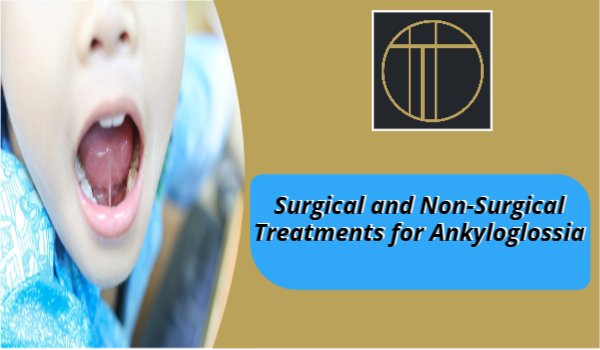Ankyloglossia, commonly known as tongue-tie, is a condition where the lingual frenulum, the tissue connecting the underside of the tongue to the floor of the mouth, is too short or tight. This can restrict tongue movement, impacting various oral functions, including breastfeeding, speech, and oral hygiene.
Understanding Ankyloglossia
Ankyloglossia can vary in severity, ranging from mild to severe. In mild cases, the frenulum may be slightly tight, causing minimal discomfort or functional limitations. In severe cases, the frenulum may be significantly short, restricting tongue movement to a great extent.
Non-Surgical Treatments for Ankyloglossia
In some cases, non-surgical approaches may be considered, particularly for mild cases of ankyloglossia. These methods aim to gradually stretch the frenulum and improve tongue mobility over time. Non-surgical treatments include:
- Oral Exercises: Specific exercises can be performed to stretch the frenulum and improve tongue mobility. A speech-language pathologist can provide guidance on appropriate exercises.
- Tongue Massage: Gentle massage of the frenulum can help to increase flexibility and reduce tension.
Surgical Treatment for Ankyloglossia
For moderate to severe cases of ankyloglossia, surgical intervention may be necessary to release the tight frenulum. The procedure, known as a frenotomy, is a simple and minimally invasive outpatient procedure.
The Frenotomy Procedure
The frenotomy procedure typically involves the following steps:
- Local Anaesthesia: Local anaesthesia is administered to numb the area around the frenulum.
- Incision: A small incision is made in the frenulum to release the tight tissue.
- Cauterization: The incision is often cauterized to stop any bleeding.
The entire procedure usually takes only a few minutes and is generally well-tolerated by patients of all ages.
Post-Operative Care
After the frenotomy procedure, it is important to follow post-operative care instructions to ensure proper healing and optimal results. These instructions may include:
- Oral Hygiene: Gentle oral hygiene practices to keep the mouth clean and prevent infection.
- Soft Diet: A soft diet may be recommended for a few days to avoid irritation to the healing tissue.
- Pain Management: Over-the-counter pain relievers can be used to manage any discomfort.
The Benefits of Ankyloglossia Treatment
Early diagnosis and treatment of ankyloglossia can offer numerous benefits, including:
- Improved Breastfeeding: Easier latching, increased milk transfer, and reduced nipple pain.
- Enhanced Speech Development: Clearer articulation, improved pronunciation, and increased confidence.
- Better Oral Health: Reduced risk of dental issues, improved oral hygiene, and healthier gums.
- Psychological Well-being: Increased self-esteem and social interaction.
Conclusion
Ankyloglossia can have a significant impact on a child’s oral health, speech development, and overall well-being. Early diagnosis and appropriate treatment, whether non-surgical or surgical, can significantly improve a child’s quality of life.
If you have any concerns about your child’s oral health or suspect they may have ankyloglossia, please consult with a qualified healthcare professional. At Town Hall Dental, we offer comprehensive oral health services, including ankyloglossia diagnosis and treatment.
Please feel free to leave a comment below with any questions or experiences you may have regarding ankyloglossia.
